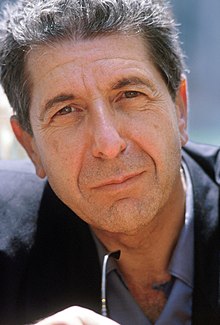Death of a Lady's Man
| Leonard Cohen CC GOQ |
|
|---|---|

Cohen in 1988
|
|
| Background information | |
| Birth name | Leonard Norman Cohen |
| Born |
September 21, 1934 Westmount, Quebec, Canada |
| Died | November 7, 2016 (aged 82) Los Angeles, California, U.S. |
| Genres | |
| Occupation(s) |
|
| Instruments |
|
| Years active | 1956–2016 |
| Labels | Columbia |
| Website | leonardcohen |
Leonard Norman Cohen CC GOQ (September 21, 1934 – November 7, 2016) was a Canadian singer, songwriter, musician, poet, novelist, and painter. His work explored religion, politics, isolation, sexuality, and personal relationships. Cohen was inducted into the Canadian Music Hall of Fame, the Canadian Songwriters Hall of Fame, and the Rock and Roll Hall of Fame. He was a Companion of the Order of Canada, the nation's highest civilian honor. In 2011, Cohen received one of the Prince of Asturias Awards for literature and the ninth Glenn Gould Prize.
Cohen pursued a career as a poet and novelist during the 1950s and early 1960s; he did not launch a music career until 1967, at the age of 33. His first album, Songs of Leonard Cohen (1967), was followed by three more albums of folk music: Songs from a Room (1969), Songs of Love and Hate (1971) and New Skin for the Old Ceremony (1974). His 1977 record Death of a Ladies' Man was co-written and produced by Phil Spector, which was a move away from Cohen's previous minimalist sound. In 1979, Cohen returned with the more traditional Recent Songs, which blended his acoustic style with jazz and Oriental and Mediterranean influences. Perhaps Cohen's most famous song, "Hallelujah" was first released on his studio album Various Positions in 1984. I'm Your Man in 1988 marked Cohen's turn to synthesized productions and remains his most popular album. In 1992, Cohen released its follow-up, The Future, which had dark lyrics and references to political and social unrest.
...
Wikipedia
